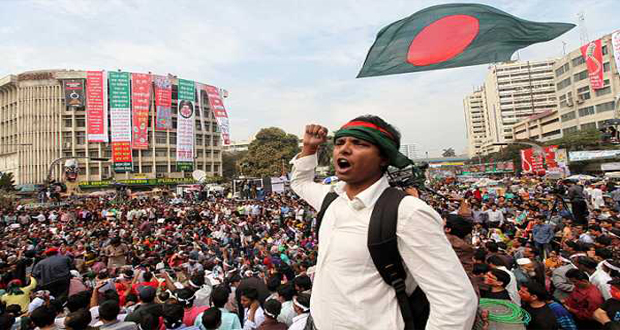We have seen Bangladesh mentioned in the news for a plethora of reasons lately. Most of them were negative in nature, be it the rise of the Islamic fundamentalism in Bangladesh, or the crippling state of law and order in the state, with bloggers being killed in open daylight and police failing to take action.Therefore, most of us have given up on the idea of Bangladesh that was envisioned by the Late Shekh Mujibur Rahman, the first Prime Minister of Bangladesh.
Mujibur’s idea of Bangladesh was based on progressive principles and secular values, for a country which was born out of mass movements and student agitation it’s a shame that Bangladesh is now facing such problems, but all is not lost it. During the last few days young people came out protesting against reservations in government jobs.
The protest started from the historical Dhaka University, being the cradle of many historic mass movements in Bangladesh. It provided a platform for young people who were frustrated and fed up with the lack of meritocracy within the selection process for government jobs.
Bangladesh, just like India, has a system of reservations which reserves a considerable amount of seats for special groups such as descendants of freedom fighters, various ethnic groups and women. Students started protesting against reservations as they felt it compromised the collective merit of the government and further felt it dissuades people of merit to join government ranks.
According to police reports, a crowd of 5000-strong marched at Dhaka University which led to major blockades throughout the capital, as more and more students from other private universities flocked to join them to mount pressure on the government to abolish reservations, or at least cut down the quotas by a significant margin.
Students from the southern city of Chittagong also blocked rail tracks and caused disruptions in cities like Khulna, Barisal, Kushtia, Comilla and Mymensingh. A section of students also broke into the Vice-Chancellor’s campus residence and forced the chancellor’s family to flee in panic. On the other hand, in Dhaka University campus alone approximately 100 people were injured by rubber bullets and tear gas used by riot police. Despite the government’s assurances to review the quota system, the students continued protesting as these young people knew, that in a democracy, assurances are only valid in crisis and they seem to go away after the crisis dissipates .
The students had the last laugh as Prime Minister Sheikh Hasina promised to abolish the quota system altogether, She stated –
“”The quota system will be abolished as the students do not want it.”
Now, what lessons can Indians learn from this historical protest in Bangladesh? In a country like India where people would destroy and pillage public property to get special reservations, we must take lessons from the young people who marched in the streets of Dhaka. We must understand as they have understood that if job creation is not based on the principle of merit then it becomes a den of mediocrity.
